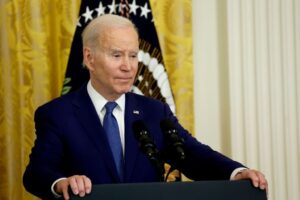As is often the case with noble purposes, the results do not meet expectations. What China might do two decades later was not part of the calculus in the US and its allies taking down the Iraqi army and freeing the Iraqi people. The US invasion and liberation of Iraq in March 2003 lasted 21 days, ending on April 9, when Saddam Hussein’s brutal regime collapsed and major combat engagements for US and partner forces stopped. Twenty years later, pundits and perfect-hindsight-seers heap criticism on America for either bungling Operation Iraqi Freedom or for starting it in the first place.
However, some believe the absence of a US military stationed in Iraq has opened wide the door for a Chinese economic and political presence that will prove inimical to US interests. Gloating over what it says is a “brighter future with Chinese companies’ efforts,” Global Times, the CCP’s propaganda mouthpiece, asserts: “For these Chinese constructors, this is much more than just a job opportunity or business project but is a chance to make a meaningful contribution to the local people who have gone through the pain of war.” However, the Muslim Uighurs in the north-western region of Xinjiang, China, who have felt the genocidal persecution of the CCP’s iron hand, might have a different view.
Freeing Iraq Did Not Include China
By way of background, remembering what US and coalition forces did in freeing Iraqis from a vicious dictator is helpful. Former Deputy Secretary of Defense Paul Wolfowitz described in a meaningful way in testimony to the Senate Armed Services Committee what US and coalition intervention in Iraq meant to the Iraqi people. Wolfowitz quoted an Iraqi blogger on the first free election day the country had seen for decades:
“My condolences to the great American people for their recent tragic losses of soldiers. The blood of Iraqis and Americans is being shed on the soil of Mesopotamia, a baptism with blood, a baptism of a lasting friendship and alliance for many years to come through thick and thin. We shall never forget the brave soldiers fallen while defending our freedom and future.”
Unfortunately, time and turmoil intervened. The Obama-Biden administration beat a hasty retreat out of Iraq after failing to secure a status of forces agreement. Josh Rogin, writing in Foreign Policy, characterized the talks as “bungled.” Though then-President Obama claimed the withdrawal of US troops was the plan all along, “the administration appeared to try hard negotiate a deal for thousands of troops to remain – and failed,” Rogin explained in his 2011 article.
Without a structured and disciplined withdrawal of a strong US presence, the hard-core remnants of the al-Qaida in Iraq-based insurgency coalesced around the jihadist leader Abu Bakr al-Baghdadi to create the Islamic State of Iraq and Syria (ISIS). During former President Obama’s term in office, ISIS became the most ubiquitous brutal terrorist organization roaming about in northern Iraq and Syria, taking control of the Iraqi towns of Falluja, Mosul, and Tikrit, and killing innocents at will. Not until the Trump administration made ISIS a priority, employed US forces with Iraqi soldiers, killed Baghdadi, and decimated ISIS did some level of calm return to Iraq.
When the US Cat Is Away, China Will Play

Joe Biden (Photo by Anna Moneymaker/Getty Images)
But the absence of an effective US contingent in Iraq has left a vacuum of influence. Furthermore, the Biden administration seems not to notice. Consequently, current US nonchalance has left a hole in western political and economic shaping, leaving the door open for Beijing to buy its way into Iraq. And the People’s Republic of China (PRC) is taking every advantage to be part of Iraq’s future. The PRC has its Belt and Road initiative underway to circle the globe with its economic and military might. The failure of the US to stand in the way of the PRC’s worldwide momentum has not gone unnoticed by the rest of the world. Allowing China to gain a foothold in Iraq by not paying enough attention and “Those omissions should count as further blunders,” Daniel Williams wrote recently in Asian Times. Williams’ more stinging indictment of the US was reflected in the subtitle of his article, where he asserts the “Iraq War aimed to democratize the Middle East but instead eroded the myth of US omnipotence while creating space for rival powers.”
Iraq is one example of when the US does not mind the store, mischief happens. The PRC doesn’t make a secret of its intentions. Liberty Nation has previously reported on the insatiable Beijing appetite for displacing the US as the superpower in the world and is insinuating itself into the economic and military fabric of one nation after another. It’s easy to look back and understand with great clarity what should have been done. Unfortunately, past ills cannot be healed easily. The Biden administration must look forward and do what needs to be done.
The views expressed are those of the author and not of any other affiliation.
Do you have an opinion about this article? We’d love to hear it! If you send your comments to [email protected], we might even publish your edited remarks in our new feature, LN Readers Speak Out. Remember to include the title of the article along with your name, city, and state.
Please respect our republishing guidelines. Republication permission does not equal site endorsement. Click here.

